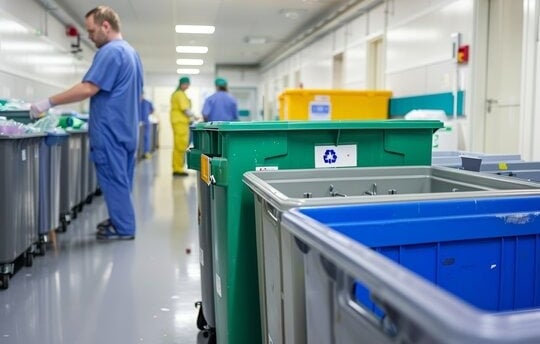FOR ANY QUERIES, CONTACT +91-7827848487 OR MAIL AT INFO.olympicksmedical@gmail.com
Embracing Sustainable Healthcare: The Crucial Role of Biowaste Management in the Healthcare Industry
Discover how effective biowaste management is crucial to minimizing the environmental impact of the healthcare industry. Learn about the challenges and innovative solutions that are driving the shift towards a more sustainable healthcare system. Explore the future of healthcare where patient care and environmental responsibility go hand in hand. 🌱 #SustainableHealthcare #BiowasteManagement #HealthcareInnovation #EnvironmentalResponsibility
SUSTAINABLE MANAGEMENT
5/8/20243 मिनट पढ़ें


The healthcare industry plays a vital role in saving lives and improving the quality of life for millions around the globe. However, it also has a significant environmental impact, particularly through the generation of biomedical waste. As the industry continues to grow, the need for sustainable practices, including effective biowaste management, has never been more critical. This blog explores the importance of sustainable healthcare, the challenges of biowaste management, and the innovative solutions that are helping to create a healthier future for both people and the planet.
The Environmental Impact of Healthcare
Healthcare facilities, from hospitals to clinics, are responsible for a substantial amount of waste. This waste includes not only general trash but also hazardous biomedical waste that requires careful handling and disposal. Biomedical waste includes items such as used syringes, bandages, surgical gloves, expired pharmaceuticals, and other materials that can pose a risk to public health and the environment if not managed properly.
According to the World Health Organization (WHO), approximately 85% of the waste generated by healthcare activities is general, non-hazardous waste. However, the remaining 15% is considered hazardous, potentially infectious, toxic, or radioactive. The improper disposal of this waste can lead to severe consequences, including the spread of infections, contamination of water sources, and harm to wildlife and ecosystems.
The Need for Sustainable Healthcare
Sustainable healthcare is about finding the balance between providing high-quality patient care and minimizing the environmental impact of healthcare practices. This includes reducing energy consumption, minimizing waste, and implementing eco-friendly practices across all aspects of healthcare operations.
Effective biowaste management is a cornerstone of sustainable healthcare. By properly managing biomedical waste, healthcare facilities can reduce their environmental footprint, protect public health, and comply with stringent regulations designed to ensure safe waste disposal.
Challenges in Biowaste Management
Biowaste management in the healthcare industry presents several challenges, including:
1. Volume of Waste: The sheer volume of waste generated by healthcare facilities can be overwhelming. As medical procedures become more advanced and the demand for healthcare services increases, so does the amount of waste produced.
2. Segregation and Handling: Proper segregation of biomedical waste at the source is critical. However, it requires ongoing training and diligence from healthcare workers to ensure that hazardous waste is not mixed with general waste.
3. Regulatory Compliance: Healthcare facilities must adhere to strict local, national, and international regulations regarding the disposal of biomedical waste. Non-compliance can result in legal consequences and pose serious health risks.
4. Disposal Methods: The methods used to dispose of biomedical waste, such as incineration and landfilling, can have negative environmental impacts. Incineration, for instance, can release harmful pollutants into the air, while landfilling can lead to soil and water contamination.
Innovative Solutions for Sustainable Biowaste Management
To address these challenges, the healthcare industry is increasingly turning to innovative solutions that promote sustainability and reduce environmental impact. Some of these solutions include:
1. Advanced Waste Segregation Systems: Implementing automated and intelligent waste segregation systems helps ensure that biomedical waste is properly sorted at the source, reducing the risk of contamination and making disposal more efficient.
2. Eco-Friendly Disposal Methods: New technologies are being developed to treat biomedical waste in a more environmentally friendly manner. For example, non-burn technologies such as autoclaving, microwave treatment, and chemical disinfection are gaining traction as safer alternatives to incineration.
3. Recycling and Reprocessing: Where possible, healthcare facilities are adopting recycling programs for non-hazardous waste. Additionally, some medical devices and materials can be reprocessed and reused, reducing the overall waste generated.
4. Sustainable Packaging: The use of biodegradable and recyclable packaging materials for medical supplies is becoming more common. This reduces the environmental impact of disposable items used in healthcare settings.
5. Training and Education: Ongoing training for healthcare staff on proper waste segregation, handling, and disposal is essential. Education programs help ensure that all personnel are aware of the importance of sustainable practices and how to implement them.
6. Green Procurement: Healthcare facilities are increasingly choosing suppliers and products that prioritize sustainability. This includes selecting medical supplies that are produced with minimal environmental impact and are packaged in eco-friendly materials.
The Future of Sustainable Healthcare
As the healthcare industry continues to evolve, the integration of sustainable practices, including effective biowaste management, will be critical to its success. By adopting innovative solutions and prioritizing sustainability, healthcare facilities can reduce their environmental footprint, protect public health, and contribute to a healthier planet.
In the years to come, we can expect to see even more advancements in biowaste management technology, greater emphasis on sustainability in healthcare policies, and a growing commitment to creating a healthcare system that is both effective and environmentally responsible.
Conclusion
Sustainable healthcare is not just a trend; it is a necessity for the future of both our planet and public health. By addressing the challenges of biowaste management with creativity, innovation, and a commitment to sustainability, the healthcare industry can continue to deliver high-quality care while minimizing its environmental impact.
As healthcare providers, policymakers, and communities work together to promote sustainable practices, we can look forward to a future where healthcare not only heals patients but also nurtures the environment. Embracing sustainable healthcare practices today will ensure a healthier tomorrow for generations to come.
Delivering tailored, high-quality solutions that meet diverse healthcare needs.
Contact information
For more queries
+91 8369859716 / +91-9324415526 / +91-9930323922
Shop No.01, Pandurang Wari Kalyan - Shilphata Road opp. Zenith Rubber Company Golavli Dombivli, Maharashtra 421306 India
© 2024. All rights reserved.
info.olympicksmedical@gmal.com / contact@olympicksmedical.com
